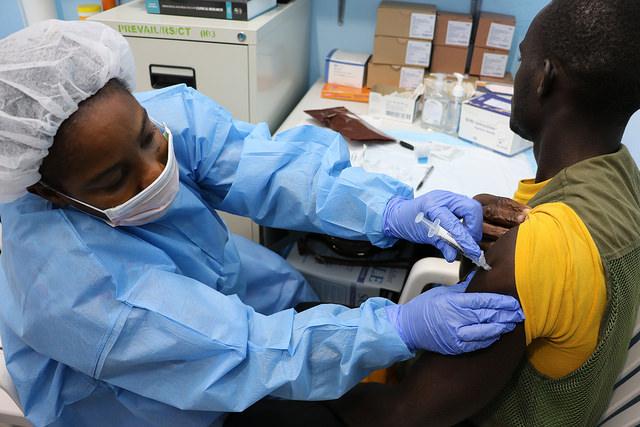An international consortium is launching a large trial in West Africa to test different Ebola vaccines and strategies, a step that could shed light on how quickly a strong immune response kicks in, how long the response lasts, and the safety profile of the vaccine candidates.
According to a statement today from the National Institutes of Health (NIH), the group is called PREVAC (the Partnership for Research on Ebola VACcination). It includes the NIH, the French National Institute of Health and Medical Research (Inserm), the London School of Hygiene and Tropical Medicine, and health officials in Guinea and Liberia.
So far, no Ebola vaccines have been licensed, though some are far along in clinical trials. Global health officials see a role for different Ebola vaccine candidates, such as responding to disease flares or immunizing key groups to prevent outbreaks. In January, an expert panel report raised concerns about momentum stalling out since cases have dropped off and articulated remaining research challenges for the different vaccines and approaches.
Trials to gauge protection, durability, safety
The main goal of PREVAC phase 2 trials, which will enroll more than 5,000 adults and children in Guinea and Liberia, is to identify the most promising regimens for preventing and controlling future outbreaks. An additional study site is planned for Sierra Leone.
More specifically, the groups will explore the safety of three vaccine strategies and if they trigger an immune response, how long the response lasts, and how the the vaccines work in different groups, such as children, for whom there is only limited information.
Yazdan Yazdanpanah, MD, PhD, PREVAC principal investigator who is with Inserm, said in the statement, "Our challenge is to identify one or more safe, effective and durable vaccines in order to prevent or control the next Ebola outbreak, for both adults and children."
Participants will be followed for at least 12 months, and an independent safety board will closely monitor safety and immune response throughout the trial. Children ages 12 to 17 will be immunized before younger children are, and the safety board will evaluate those data before determining if it is safe to immunize children ages 5 to 11. If no safety signals are seen with the second group, then kids ages 1 to 4 will be vaccinated.
Three strategies in two stages
Researchers will test three Ebola vaccination strategies against placebo in two different stages, and enrollment began on Mar 27 for the initial trial.
The first stage will evaluate a prime-boost strategy involving adenovirus vectored Ad26.ZEBOV developed by Johnson & Johnson, with a booster dose of MVA-BN-Filo from Bavarian Nordic given 8 weeks later. That part of the trial, slated to enroll 600 participants age 12 and older, will compare the vaccine combination with the same prime-boost strategy using two placebo vaccines.
For the second stage, expected to launch in the second half of 2017, researchers will compare Ad26.ZEBOV and MVA-BN-Filo combination with two more prime-boost regimens involving VSV-EBOV, a vaccine first developed by Canadian researchers that was shown to be highly effective during trials in West Africa toward the end of the outbreak. Teams will enroll 4,900 people at two sites in Guinea and one in Liberia: 3,500 healthy adults and 1,400 children ages 1 to 17 years old. The study location in Sierra Leone awaits confirmation.
Investigators will combine VSV-EBOV, licensed by NewLink Genetics and Merck, with a booster dose of the same vaccine given 8 weeks later or a placebo booster given 8 weeks later. Each of the three strategies will be tested against pairings of placebo injections.
See also:
Apr 6 NIH statement
Jan 17 CIDRAP News story "As Ebola interest ebbs, experts push for optimal vaccines, readiness"
Jan 17 Ebola Vaccine Team B report landing page

















